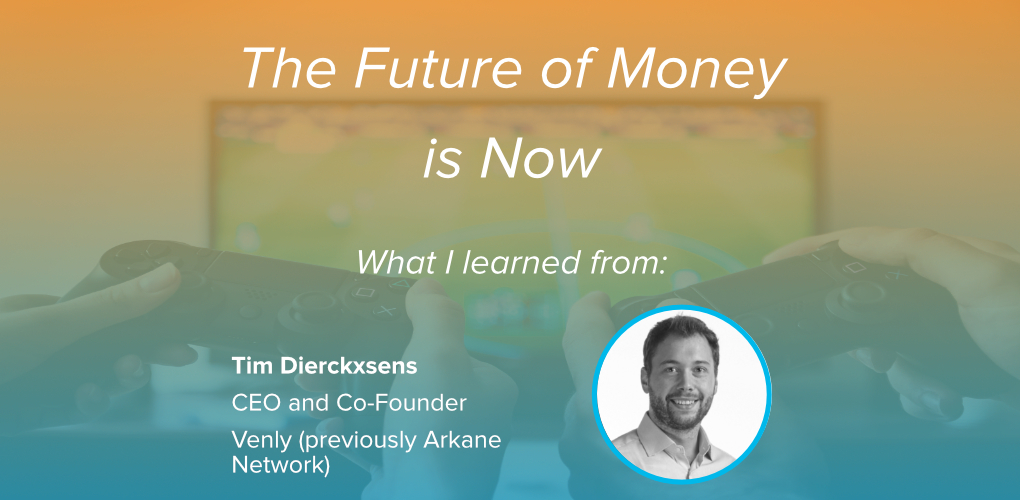
Insights & Opinions
The Future of Money is Now - What I learned from Tim Dierckxsens, CEO and Co-Founder of Venly
Tue, 09 Nov 2021


The future of money is now. That is my main conclusion of last week's session of The Banking Scene Afterwork, November 4th. Our guest was Tim Dierckxsens, Co-Founder and CEO of Venly.
Thanks to his insights, suddenly NFTs and programmable money started to make sense to me, and not in a dystopian way, to use Andrew Vorster's words. As a guideline to the discussion, Tim sent me an infographic on the future of money.
Tim has been a blockchain believer since 2014 when Vitalik Buterin wrote his white paper "A next-generation smart contract and decentralized application platform". It was only after a few years, after a drink with a banker in a bar, that he decided to build a business around blockchain.
That is when he convinced his co-founders to build Arkane Network, which later became Venly. The idea was to make blockchain technology more accessible for the end-user by building API services to create blockchain wallets easily.
It enabled companies like Bsit, a babysitting app, to tie parents and babysitters to their app. Venly technology allowed Bsit to create its own loyalty tokens BSIT. The more users enjoy the Bsit service, the more tokens they save for discounts at Bsit partners or more premium services in the Bsit app.
Imec convinced them to focus on a niche segment. Although they initially looked at the FinTech industry, they quickly realized that the gaming industry shows more openness to this kind of new technology. The rise of in-app purchases became a mature business model, not only to create new revenue but also to tie gamers to the game through collectables.
With the rise of this new digital economy came new challenges. So Venly created an API for an NFT standard.
Having both APIs for blockchain wallets and NFT management (creation, sales, distribution, marketplace) convinced Shopify to sign a deal with them after influencers like Paul Logon and Lewis Capaldi sold millions worth of NFTs using Venly technology.
NFTs are an evolution, not a revolution
We mostly talk about NFTs as a form of digital art or sports cards etc. The opportunities of NFTs go much further, though.
"It is one of the business models that is going to prove blockchain makes sense because everything around cryptocurrencies was far more intangible compared to what you can do with an NFT", explained Tim. "There's a physical representation or a digital representation of what you can do with NFTs. It makes it easier to let your imagination run wild and to figure out what the business models are that you can achieve with those standards."
To explain how mundane and how widely applicable NFTs can be, Tim shared the example of a loyalty card with a 5% discount. To him, the loyalty cards we know today are a physical version of an NFT:
- Is has a history of transactions made in the past
- It has value, as it gives the user a discount when using it
- It is exchangeable
Having this loyalty card in a digital version also allows the issuing company to have a track record on the exchange of owners. If programmed well, this could result in royalty fees every time the cards get sold. By building your loyalty cards on an NFT, you upgrade the means to pay into a contract.
The future of money is decentralized
The future of money is now. Tim: "Slowly but surely, we're moving into a more decentralized society where there's less control from the banks to really control the movement of money where blockchain is getting a part of the transfer of value."
According to Tim, the value of blockchain in that respect is that it facilitates value transactions between different parties in a network without a centralized party to prove that the value transaction has happened.
Because there are so many decentralized exchanges today, there is much liquidity to support any type to exchange from one token to the other. Once the problem of volatility is solved, and there is a real-time exchange and the proper protocols supporting it, there will always be a possibility to exchange one token versus the other, explained Tim.
He agreed that today, there is an uncontrollable growth of tokens. Still, the mechanics of supply and demand will resolve this, in his opinion. Certain tokens will drop in value and slowly die, as there is no liquidity or exchange rate to deal with them.
Decentralized does not mean deregulated. Venly is proactively talking to FSMA to see how they can implement smart regulations for KYC and AML. In that respect, Tim believes the industry should be looking more at 'know your transaction' rules instead of a KYC process for every individual wallet. Companies like Chainalysis and Scorechain have all the tools available to create transparency and trust, so wallet providers like Venly, the gateway between a network and an application, can use a tiered approach for this KYC, based on the value in a wallet.
The dystopian vs utopian view on programmable money
Programmable money sounds scary. Andrew Vorster was one of the people in the audience looking at the idea of programmable money with suspicion. He referred to the example of China and its social credits what the impact of programmable money could be. The social score determines whether you can take public transport, how much access you have to financial services etc…
He continued by asking the audience how digital currency will impact the power of platforms and whether we are ready for the possible future. As women are often excluded from technology, don't we risk creating even more gender inequality?
I've been thinking about this for a few days now, and although I give him all the credits for these remarks, I also see the upside and already existing cases that show that it can work if well regulated.
Look at dematerialized meal vouchers in Belgium. These are credits on a card that can be used purely for food products. The credits are digital and programmed to be used purely for food.
"Everything in the crypto space will also be more and more regulated because on the one hand, you have to protect the mass, the mainstream users, because not everybody is going to be very smart in the way that they handle everything", explained Tim. "But on the other hand, for me, regulation is in large part also a move of power and control."
Looking back at the remarks of Andrew, this power and control in a democracy should make technology available and understandable for all, this way avoiding the growing gap of inequality. This should also allow society to set universal rules to avoid certain regimes to start abusing the possibilities of technology.
Conclusion
What about banks, you ask? There are custody banks today, and there will be custody banks tomorrow. So even in the transaction business, Tim believes that banks have a role to play for people that prefer a higher level of trust and security to store their assets.
Even wallet providers like Venly hope to do business with banks and insurance companies to build additional services on top of what they already provide. Vice versa, it will likely be a matter of time before a bank will integrate a wallet service in their app, allowing even more people to enjoy the benefits of decentralized finance.
The future of money is now, and as banks, money will still be there tomorrow, in one form or another.